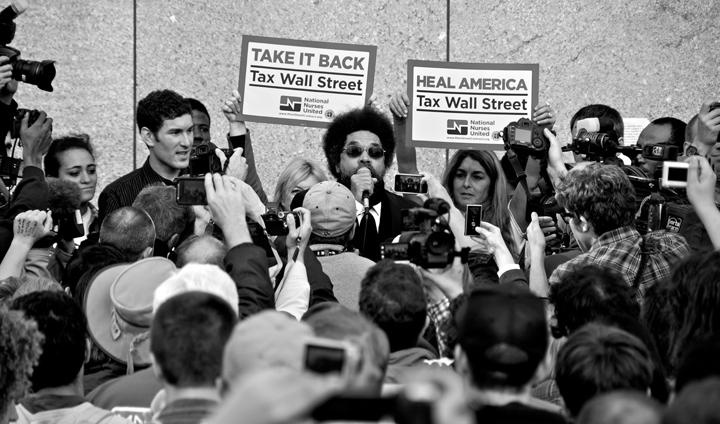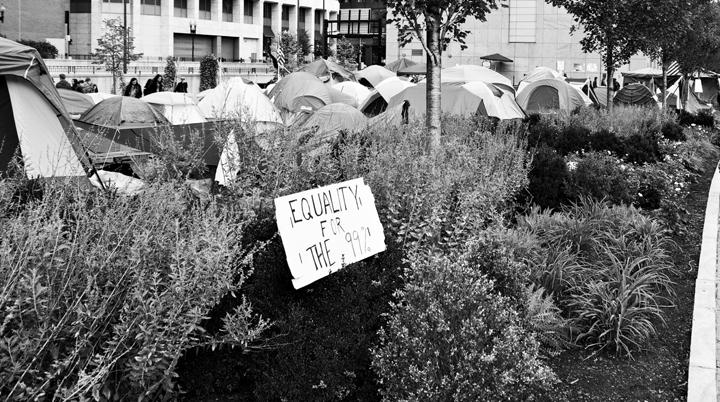Occupy Wall Street, Boston, San Francisco, and DC are protests that initially started as a better-branded version of Operation Empire State Rebellion (OpESR). These occupations began with a faction of Anonymous, a notorious Internet hacker non-group. Communication between members started on Twitter before moving into the A99 forums of AmpedStatus.org. The problem was selling “Operation Empire State Rebellion” as a brand name to the general public.
OpESR set its goal in the organization’s first communication video: “We demand that the primary dealers within the Federal Reserve banking system be broken up and held accountable for rigging markets and destroying the global economy, effective immediately.”
Their intent seems radical, but their demands are very specific, pointing out who the puppet masters of ubercapitalism are. Yes, there were quite a few radicals present at the protests, but there were also many normal day-to-day citizens.
Many avid readers from Zerohedge.com, which promoted the movement, flooded in, myself included. It was a positive outcome, as most of that readership had professional economic and financial experience.
Zerohedgers managed to calm the “Let’s Burn It All Down!” crew long enough to explain why economics and finance are crucial to society, and how balanced competitive markets became dangerously financialized due to bad policy decisions by our government. Through forum talk and debate amongst members, OpESR become more realistic and less violently grandiose.
Though the June protest date passed without any actual protest, disharmony still existed. The employment rate remained steady through the summer before the debt-ceiling nonsense hit the news. After that weekend, Standard and Poor downgraded US bond ratings. Go figure, they’re pretending the deficit total is $14 trillion; but when you include Social Security and Medicare obligations, the total is much higher.
Truth be told, the irony rises tenfold from the situation when you realize that we print our own money – which the whole world uses for international trade – and we issue debt in our own currency. That means that, excluding inflationary impact, we could technically print out money and pay back whoever we owe. This is why default is supposedly an impossibility.
Fast forward to the present. The debt crisis is moving towards the core of the Eurozone. Dexia, a Franco-Belgian bank, has seen its shares pummeled down to 42 percent in the past few weeks. Dexia is starting to look like Creditanstalt. Greece’s tax collectors are on strike, and they literally ran out of ink for their tax printers. France and Belgium may need guarantees for $200 billion in assets, which is greater than 55 percent of Belgian GDP. Working on version two of the European Financial Stability Fund (EFSF), Europe can’t reach consensus. Slovakia refused to ratify the EFSF expansion. When asked why, Richard Sulik, head of the Slovak party, stated, “It’s an attempt to use fresh debt to solve the debt crisis. That will never work[…] They took on too much risk. That one might go broke as a consequence of bad decisions is just part of the market economy. Of course, states have to protect the savings of their populations; but that’s much cheaper than bailing banks out. And that, in turn, is much cheaper than bailing entire states out.”
If the Eurozone fails, it will be worse than Lehman Brother’s bankruptcy. Ironically, it is better if it happens sooner rather than later, yet the only solution politicians keep pushing is incurring more debt to try to solve current debt. Shenanigans!
Wall Street is very, very powerful. JP Morgan Chase tossed $4.6 million to the NYC police force. Subsequently, 700 protesters supposedly get tricked by police on Brooklyn bridge and arrested. Am I surprised? No.
I’m waiting for the EU to collapse, for higher unemployment, and to hear further all-around horrible economic news. I’m waiting to see if you, your neighbor, your best friend and his/her best friend lose their jobs, and can’t afford to eat. That is when these protests are going to get really interesting, and by “really interesting” I mean violent. Nothing pisses people off more than not being able to eat or feed their children. Right now, its just a small start in 25 cities. I am waiting for martial law.
The Occupy movement has good intentions, but is also largely ignorant of how finance and economics work. I’ve heard they wanted to end “corporate person-hood.” This is stupid. They want student debt loan forgiveness. This is also stupid. To allow a student to discharge student loans in bankruptcy court is a good fix, but allowing student debt forgiveness would ensure people would milk the system. This movement needs its own Maximilien Robespierre: someone who knows the pain of the masses and can unite them, but is also educated enough to articulate functional solutions. Otherwise, if left-right politics jump on the bandwagon and start steering, they’ll discredit themselves with their own stupidity and radicalism – just like the Tea Party movement.
Sign reads "Equality for the 99%" a popular slogan used by supporters of the movement.






















































